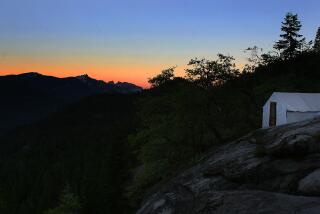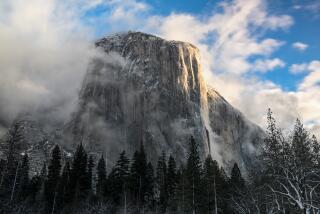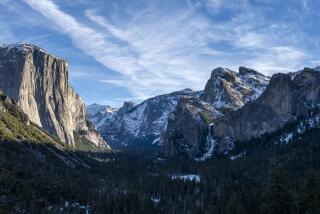Yosemite National Park: Sleeping in a bag or in a hotel bed?
YOSEMITE NATIONAL PARK — A creature of habit, Brian Ouzounian joins a swallow-like migration each summer to this park’s glacier-cleaved valley.
Ouzounian has camped in Yosemite Valley in nearly every one of his 57 years, setting down stakes a week at a time with family and friends at the panoramic junction of the Merced River and Tenaya Creek.
He lives for those days and the memories of them. Morning hikes to the valley rim. Inner-tube afternoons on the river. Nights in a sleeping bag, under the stars. First light striking Glacier Point. Sizzling bacon, chirping birds and the burbling river play a symphony to his soul.
But this family tradition, which used to seem as solid as the granite cliffs, now appears imperiled to Ouzounian. Add us, he says, to the federal list: The endangered campers of Yosemite.
Ouzounian, who petitions and protests, writes letters and attends park meetings, believes he is leading a fight against the extinction of his kind.
People may still come in RVs and SUVs loaded with tents and sleeping bags and Coleman stoves, but the opportunities for camping — the bargain-basement entree in Yosemite Valley — have been in decline over the last decade.
After a New Year’s flood in 1997 cut a destructive swath through the valley, National Park Service officials abandoned several riverfront campgrounds, justifying it as a way to shrink humanity’s footprint and give nature a hand up along the banks of the Merced.
The number of valley campsites fell 43%, from 828 slots to 475 today — and only about 300 of those remaining are the car-camper spots Ouzounian, a general contractor from West Los Angeles, considers akin to Mom and apple pie.
Just count the dearly departed, he says. Upper River Campground — gone. Lower River Campground — gone. Lower Pines Campground — shrunk roughly by half. The group campground across the creek — gone.
The past quarter of a century has seen a shift in lodging tastes — and as baby boomers have given way to Generations X and Y, the number of tent and RV campers in national parks across the U.S. has dropped 44%. Meanwhile, the number of visitors in fixed-roof park lodgings has barely changed at all.
The camping decline comes amid debate over how to balance nature’s needs with the recreational agenda of national park visitors. Ouzounian believes Yosemite’s planning efforts “have profit motives written all over them.” The valley now has nearly three times more lodging units than campsites, and in that he sees a socioeconomic plot, a push to place more valley visitors in expensive accommodations.
Campers, he says, are the underdogs: “We’re at the bottom of the food chain. You’ve got a camping culture that’s more than a century old, but the park service really doesn’t want to hear from us.”
For nearly three decades, Ouzounian has been trying his red-faced best to be heard.
As a young man just turned 30, he began jousting with park officials in 1980 over a general management plan that proposed a campsite reduction. He later helped launch the Yosemite Valley Campers Coalition, like-minded car campers worried that park service leaders have, as Ouzounian puts it, “confiscated” whole campgrounds without proper public discourse.
His latest effort is an online petition calling for the return of the flood-closed campsites. His goal is to send the thoughts of 10,000 campers to Congress. At last count, he had collected more than 700 signatures and testimonials from as far away as Massachusetts and Florida.
Diane Mello wrote that camping provides a more “intimate” Yosemite experience than hunkering down in a hotel room. Joel Swan of Illinois spoke of the slippery slope if the National Park Service discriminates against those of modest means. Richard Conklin suggested that “John Muir is turning over in his grave.”
Or maybe he’s applauding. Park officials insist they remain bullish on camping, but they point out that times have changed.
A few generations back, 80% of Yosemite visitors spent the night, said park spokesman Scott Gediman. Now just 20% do, a sure sign that people’s vacation patterns are changing. They’re taking fewer days off, planning shorter excursions. Research shows that in the park, hotel-style accommodations are king.
Meanwhile, the park service is struggling to strike a delicate equilibrium between accommodating 3 million annual visitors — making Yosemite the nation’s third-most-visited park behind Great Smoky Mountains and the Grand Canyon — and protecting nature. Even before the flood sent the Merced a dozen feet above its banks, “there was a realization that the riverfront wasn’t the best place for a campground,” Gediman said, taking note of the fragile flora and river biota that can be unwittingly trampled in the zeal to experience the great outdoors.
“Camping is just as valid now as it was 50 years ago,” Gediman insists. “We just need to do it differently.”
That will almost certainly mean more campsites built outside the mile-wide valley. A park study identified 400 to 600 potential out-of-valley campsites, though none have been created.
In the valley, Gediman said, it will mean designing campsites that maximize space and ease environmental impacts — special RV spaces with electrical hookups to eliminate noisy on-board generators, and walk-in campgrounds that squeeze more people into a smaller space. The goal is to eventually shoehorn in 638 valley campsites.
Construction was set, he said, for 30 such RV spaces and 59 walk-in campsites, but a long-running legal fight with environmental groups over plans for Yosemite Valley has put the work on hold. Gediman said he finds it ironic that Ouzounian is in the court record supporting a lawsuit that is blocking campsite construction.
“Those sites would have been finished and in use by now,” he said. “Brian has cut off his nose to spite his face.”
Ouzounian has earned a reputation among park officials. At public meetings and in private, he has at times left staffers feeling bullied, Gediman said.
“Raising your voice, antagonizing people and being rude isn’t the way to get it done,” Gediman said.
Ouzounian is unapologetic. “I’m their worst nightmare,” he said.
Such tough talk seems incongruous coming from a man who can turn misty-eyed from campfire memories. As he walks amid the valley’s campground conifers, the balding father of three college-age kids waxes philosophical.
He points out that Abraham Lincoln was the first president to recognize Yosemite’s grandeur. He delights in quoting Frederick Law Olmsted, the pioneering landscape architect who in 1865 visited Yosemite and wrote of the effect of nature’s beauty on the human soul and government’s responsibility to preserve the nation’s wild lands.
To Ouzounian, car campers are the embodiment of Olmsted’s philosophy because they enjoy the outdoors with far less impact than visitors who spend the night in a hotel or come for the day.
While day trippers clog roads with pollution-spewing cars, campers get around on bikes, he says. They bring their own food instead of relying on the vast infrastructure of delivery trucks and food-service employees and utilities needed by restaurants. They bunk down in tents that don’t require maid service, laundered sheets and all the rest.
“That’s an environmental equation the park would rather you not know,” Ouzounian said.
His ire for the park service isn’t part of his DNA. As a boy, Ouzounian saw rangers as his idols. Each summer, his grandparents, Yosemite campers since the 1920s, invited the campground ranger over for dinner.
“Now a ranger walks up and you wonder when they’re going to pull their citation book out,” he said.
He’s been chided by bear-wary rangers to put away toothpaste tubes left out for five minutes, and cited for hanging up a fly trap that could disrupt insect life.
It all seems petty to Ouzounian, particularly in contrast with the old traditions. Back in the day, tents were pitched wall to wall, he said. The tight quarters yielded lifelong friendships, families he has known for generations. They attend one another’s weddings, graduations and funerals.
When he was a boy, his big thrill each morning was making Grandpa’s fire. It was stoked under the lid of a 55-gallon oil drum, jury-rigged with a piece of rusty tin pipe as a flue.
The kids slept on old Army-style steel cots. Sleep came only after the evening fire show concluded off Glacier Point. (The summer ritual of sending an avalanche of blazing cinders off the cliff was halted in 1968.)
On the banks of the Merced River, Grandpa would demonstrate how to make a water wheel out of a tin can, cutting flaps and then mounting it on a stick.
When the old man died, the family paid tribute to his lifetime love of camping in Yosemite. They bowed at his open casket and placed a piece of black oak inside.
North Pines Campground has always been Ouzounian’s haunt. All things being equal, he tries for a space on the narrow spit at the junction of the creek and river.
The family used to simply show up and elbow into the horde.
Now a week’s stay requires going online five months in advance to make a reservation — and this year, Ouzounian’s repeated attempts to reserve a site failed. The Internet throngs sold out the valley within the first minute the reservation system was open.
Ouzounian managed to hitch on at a campsite reserved by friends. But instead of relaxing, he spent much of the lovely July week walking the campgrounds, talking up his cause and handing out placards: “SAVE NORTH PINES: Planned for Removal by the National Park Service.”
His fear on this front stems from the master plan for Yosemite Valley, approved at the beginning of the decade over the protests of critics who said it favored hotel lodging and smacked of elitism. Among the targets for removal was North Pines, the Ouzounian clan’s second home.
Park officials now say their plans have changed and that Ouzounian’s worries are unwarranted. Battered by litigation and criticism, Yosemite planners in 2005 redrafted the park’s riverside zoning, sparing the campground.
Ouzounian refuses to buy that North Pines is safe, saying he trusts “nothing that spews from the mouths at the park service.”
Walking past the long-ago spot on the Merced River where his grandparents used to pitch their tent, he unhappily points out a split rail fence erected to keep the public at bay. A park service sign advises that the riverbank’s plants can’t withstand the foot traffic.
To Ouzounian it’s a line of demarcation, a sign of decline and loss, the beginning of the end of the culture he used to know.
“The people I represent want their kids to wake in the morning hearing the birds, hearing the river, hearing the wind go through the trees,” he said. “You can’t get that inside a motel room.”
For more information about Yosemite National Park and the Yosemite Valley Campers Coalition, go towww.nps.gov/archive /yose/planning and www.yosemitevalleycampers.org.
Comments? Email travel-feedback@latimes.com
More to Read
Sign up for The Wild
We’ll help you find the best places to hike, bike and run, as well as the perfect silent spots for meditation and yoga.
You may occasionally receive promotional content from the Los Angeles Times.






